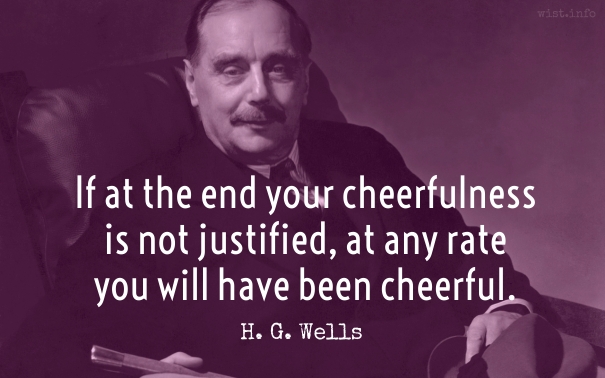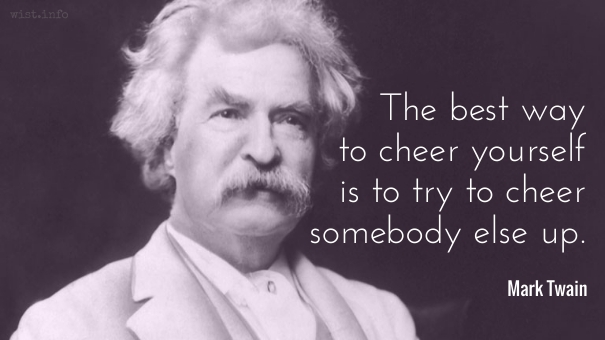And know, reader, that an ounce of mirth, with the same degree of grace, will serve God farther than a pound of sadness.
Thomas Fuller (1608-1661) English churchman, historian
The History of the Worthies of England, “Worthies of Hertfordshire,” “Writers” (1662)
(Source)
Writing of Jeremiah Dike. By the late 19th Century, Fuller's comment had been paraphrased into something simpler, though still attributed to him:An ounce of cheerfulness is worth a pound of sadness to serve God with.
[Source 1872, 1895, 1867]
This sentiment is not unique to Fuller. In Richard Baxter's A Treatise of Self-Denial (1659), in "A Dialog of Self-Denial" between Flesh and Spirit, Flesh says:Why should I think of what will be tomorrow?
An ounce of mirth is worth a pound of sorrow.
The second line here may have been a common English aphorism prior to Fuller and Baxter.
Quotations about:
cheerfulness
Note not all quotations have been tagged, so Search may find additional quotes on this topic.
A cheerful life is what the Muses love,
A soaring spirit is their prime delight.William Wordsworth (1770-1850) English poet
“From the Dark Chambers of Dejection Freed,” ll. 13-14 (1814)
(Source)
A cheerful temper joined with innocence will make beauty attractive, knowledge delightful and wit good-natured. It will lighten sickness, poverty and affliction, convert ignorance into an amiable simplicity, and render deformity itself agreeable.
Cheerfulness is to the spiritual atmosphere what sunshine is to the earthly landscape. I am resolved to cherish cheerfulness with might and main.
Lydia Maria Child (1802-1880) American abolitionist, activist, journalist, suffragist
Letter to Lucy Osgood (1865)
(Source)
A good laugh overcomes more difficulties and dissipates more dark clouds than any other one thing.
Laura Ingalls Wilder (1867-1957) American writer
“‘Thoughts are Things,'” Missouri Ruralist (5 Nov 1917)
(Source)
Reprinted in Stephen Hines, ed., Laura Ingalls Wilder - Farm Journalist (2007).
Because society would rather we always wore a pretty face, women have been trained to cut off anger.
While there is a chance of the world getting through its troubles I hold that a reasonable man has to behave as though he was sure of it. If at the end your cheerfulness is not justified, at any rate you will have been cheerful.
I have always preferred cheerfulness to mirth. The latter I consider as an act, the former as an habit of mind. Mirth is short and transient, cheerfulness fixed and permanent. Those are often raised into the greatest transports of mirth who are subject to the greatest depressions of melancholy. On the contrary, cheerfulness, though it does not give the mind such an exquisite gladness, prevents us from falling into any depths of sorrow. Mirth is like a flash of lightning, that breaks through a gloom of clouds, and glitters for a moment; cheerfulness keeps up a kind of daylight in the mind, and fills it with a steady and perpetual serenity.
Joseph Addison (1672-1719) English essayist, poet, statesman
The Spectator, #381, “Cheerfulness and Mirth” (17 May 1712)
(Source)
KATHERINE: He made her melancholy, sad, and heavy,
And so she died. Had she been light like you,
Of such a merry, nimble, stirring spirit,
She might ha’ been a grandam ere she died.
And so may you, for a light heart lives long.William Shakespeare (1564-1616) English dramatist and poet
Love’s Labour’s Lost, Act 5, sc. 2, l. 15ff (5.2.15-19) (c. 1595)
(Source)
To Rosaline.
The best way to cheer yourself is to try to cheer somebody else up.
Mark Twain (1835-1910) American writer [pseud. of Samuel Clemens]
Note (1896-11-26), Mark Twain’s Notebook, ch. 27 “England” (1935) [ed. Albert Bigelow Paine]
(Source)
Written while in Guilford, England, shortly after the death of his daughter Susy in America.
Often given as "The best way to cheer yourself up is to try to cheer somebody else up." More discussion here.
You find yourself refreshed by the presence of cheerful people. Why not make earnest efforts to confer that pleasure on others? You will find half the battle is gained, if you never allow yourself to say anything gloomy.
A cheerful, easy countenance and behavior are very useful: they make fools think you a good-natured man, and they make designing men think you an undesigning one.
Mirth is God’s medicine. Everybody ought to bathe in it. Grim care, moroseness, anxiety — all this rust of life ought to be scoured off by the oil of mirth. It is better than emery. Every man ought to rub himself with it.














